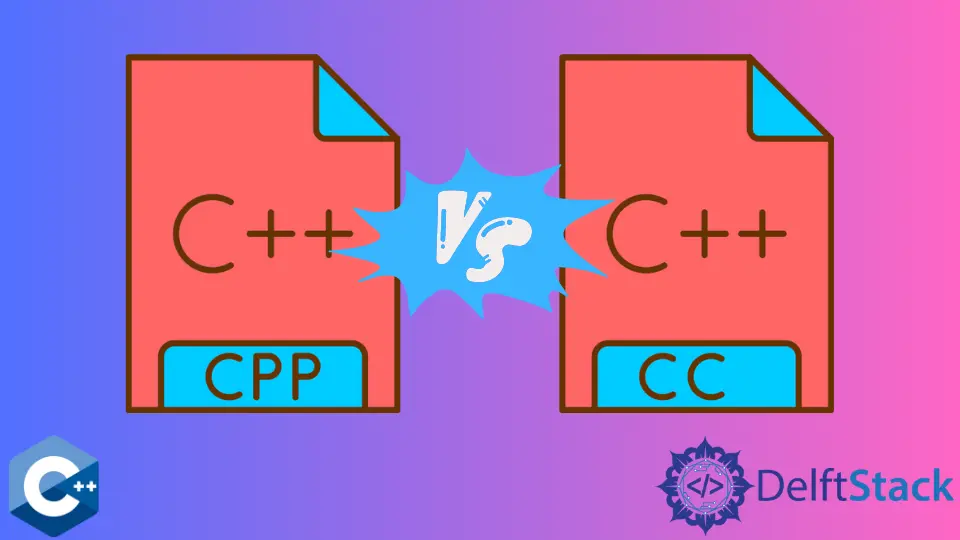Difference Between .cc and .cpp File Extensions in C++
-
the
.cppFile Extension -
the
.ccFile Extension -
Similarities Between the
.ccand.cppFile Extensions in C++ -
Differences Between the
.ccand.cppFile Extensions in C++ - Conclusion

If you have ever worked with C++ on different systems like Linux and Windows, you must have come across both .cc and .cpp file extensions. Over the internet, you will find many sources saying there is no difference between these file extensions, and there is indeed a lot of confusion about this.
In this article, we will discuss the nuances of these C++ file extensions and how they differ from each other. But before we begin comparing these two file extensions, let us first gather the information we have about the basics of these two file extensions.
the .cpp File Extension
A file with the extension .cpp is a C++ source code file. These files are also called implementation files because they have definitions for the methods declared in the header file.
This file aims to divide the interface of the C++ project from the implementation. This way, all declarations for the member functions are made in the header file, and the details for the same are kept inside the .cpp file.
We can use the .cpp file as a simple file for writing a C++ application or as a file for the class implementation. In the case of object-oriented programming, the .cpp file is used for the class definition.
For this, all the data members and functions of the class are declared inside the header file. This file refers to the header file in an include statement at the beginning of the file.
The .cpp files are compatible with Windows operating system; using some external programs, they also work with Linux and Mac Operating systems.
the .cc File Extension
A file with the extension .cc is a C++ source code file. This can contain a single program as well as functions that are compiled into machine code.
These files are compatible with Mac, Linux, and Windows operating systems and supported by various programs on these operating systems.
Refer to this documentation for a complete list of file extensions.
Similarities Between the .cc and .cpp File Extensions in C++
The .cc and .cpp file extensions are not the same, but they are related since they are both used as C++ file extensions. For a compiler, there is no difference between the two.
C++ compilers can tackle all the C++ extensions automatically without causing any trouble. The GNU GCC compiler considers all these extensions as C++ files: .cc, .c, .c++, .cp, .cxx, .cpp, .CPP, and always uses C++ compilation to compile them without us having to invoke it using GCC.
While .cpp is the recommended file extension of C++, it is more of a personal preference as to what you decide to use. It might also depend on the entire team of the project and hardly creates any difference.
If the project is related to open source, it is a good practice to use what is common in the community, which is .cpp. This is all about how these two file extensions are somewhat related.
Now let us dive into the much-awaited discussion: the difference between the .cc and .cpp file extensions.
Differences Between the .cc and .cpp File Extensions in C++
The differences between the .cc and .cpp file extensions can be summarized based on various factors. These include the working environment, operating system, old conventions, and origin of these file extensions.
Below are all the points of difference between these two file extensions:
-
Different environments support different file extensions. The
.ccfile extension is primarily supported by Unix, GNU C++, Clang, Microsoft Visual C++, and Metrowerks CodeWarrior.On the other hand, the
.cppfile extensions are supported by GNU C++, Clang, Digital Mars, Borland C++, Watcom, Microsoft Visual C++, and Metrowerks CodeWarrior. This kind of compatibility distinction helps cross-platform recognition and makes the code portable. -
The operating systems also play a significant role here. For Unix and Linux, the convention is
.cc, while for Windows, it is.cpp.You will see that the
.ccfile extension is more commonly used on a Linux/Unix system while a.cppfile is used primarily on Windows since it causes trouble with the.Cfile extension. For macOS, on the other hand, the.cppfile extension is preferred by Xcode. -
There is something about the origin of these two file types that also creates the difference. Initially,
.cppwas adopted as the convention for C++ files because it stands for C plus plus, and it sounds logical to be used as a C++ file extension.Since
cppalready existed at that time as C Preprocessor, there were chances of mistaking the.cppfile with the.ifile (the expansion of thecppcall). So initially, the extension was changed to.cc.Over time, because of the synonymous acronym, only
.cppgrew more popular. -
There is no doubt that Windows is by far the most used and popular operating system as compared to Linux and Unix. Because of the popularity of Windows over Linux and Unix systems, the
.cppfile extension is more commonly used. -
Another external factor that can create a distinction between these two file extensions is the use of the code base. For example, Google uses the
.ccfile extension while LLVM libc++, on the other hand, uses the.cppfile extension.
Conclusion
In this article, we saw how the .cc and .cpp file extensions are used for C++ files on different platforms and operating systems like Unix, Mac, and Windows. We also discussed what sets these two file extensions apart and what relates them to each other.
Again, it is totally up to the developer to choose any file extension as needed. This is all for this article.